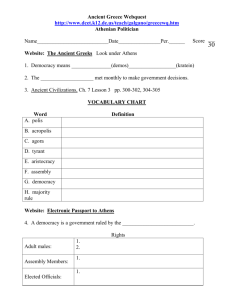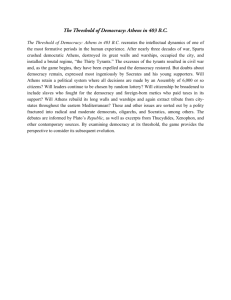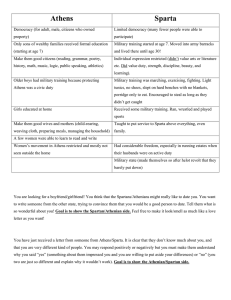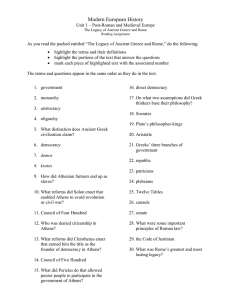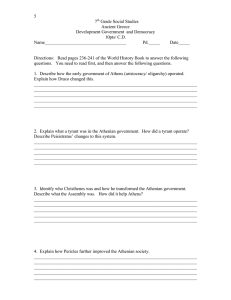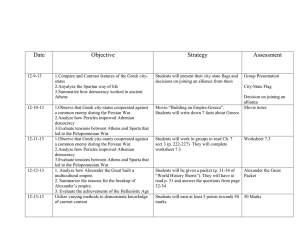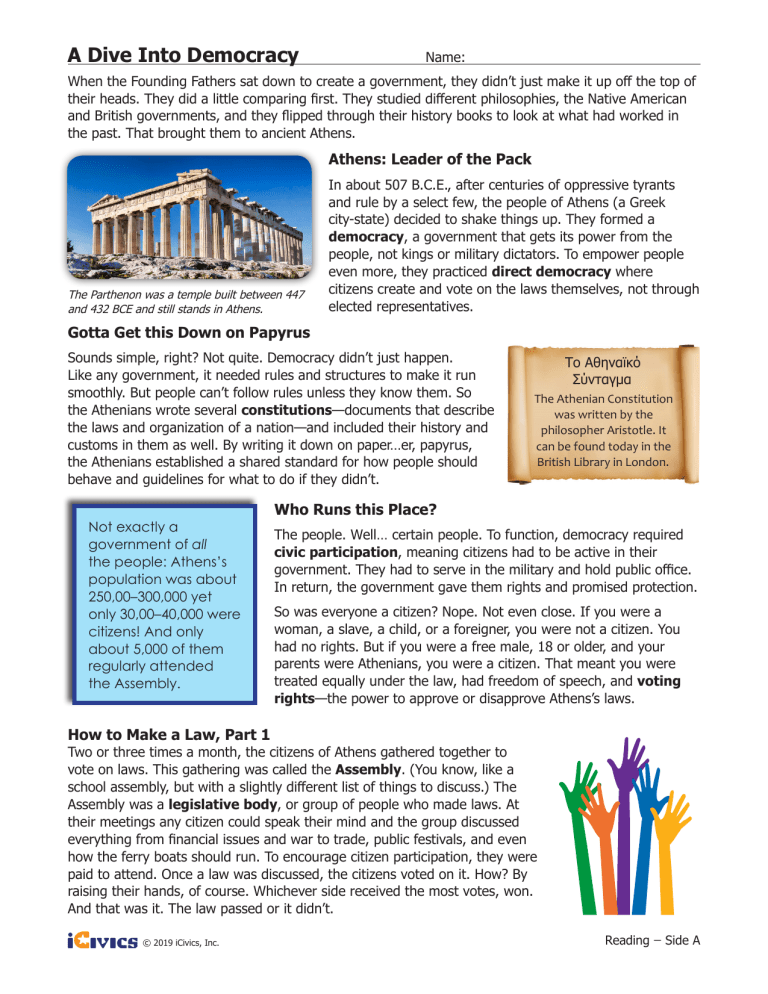
A Dive Into Democracy Name: When the Founding Fathers sat down to create a government, they didn’t just make it up off the top of their heads. They did a little comparing first. They studied different philosophies, the Native American and British governments, and they flipped through their history books to look at what had worked in the past. That brought them to ancient Athens. Athens: Leader of the Pack The Parthenon was a temple built between 447 and 432 BCE and still stands in Athens. In about 507 B.C.E., after centuries of oppressive tyrants and rule by a select few, the people of Athens (a Greek city-state) decided to shake things up. They formed a democracy, a government that gets its power from the people, not kings or military dictators. To empower people even more, they practiced direct democracy where citizens create and vote on the laws themselves, not through elected representatives. Gotta Get this Down on Papyrus Sounds simple, right? Not quite. Democracy didn’t just happen. Like any government, it needed rules and structures to make it run smoothly. But people can’t follow rules unless they know them. So the Athenians wrote several constitutions—documents that describe the laws and organization of a nation—and included their history and customs in them as well. By writing it down on paper…er, papyrus, the Athenians established a shared standard for how people should behave and guidelines for what to do if they didn’t. Not exactly a government of all the people: Athens’s population was about 250,00–300,000 yet only 30,00–40,000 were citizens! And only about 5,000 of them regularly attended the Assembly. Το Αθηναϊκό Σύνταγμα The Athenian Constitution was written by the philosopher Aristotle. It can be found today in the British Library in London. Who Runs this Place? The people. Well… certain people. To function, democracy required civic participation, meaning citizens had to be active in their government. They had to serve in the military and hold public office. In return, the government gave them rights and promised protection. So was everyone a citizen? Nope. Not even close. If you were a woman, a slave, a child, or a foreigner, you were not a citizen. You had no rights. But if you were a free male, 18 or older, and your parents were Athenians, you were a citizen. That meant you were treated equally under the law, had freedom of speech, and voting rights—the power to approve or disapprove Athens’s laws. How to Make a Law, Part 1 Two or three times a month, the citizens of Athens gathered together to vote on laws. This gathering was called the Assembly. (You know, like a school assembly, but with a slightly different list of things to discuss.) The Assembly was a legislative body, or group of people who made laws. At their meetings any citizen could speak their mind and the group discussed everything from financial issues and war to trade, public festivals, and even how the ferry boats should run. To encourage citizen participation, they were paid to attend. Once a law was discussed, the citizens voted on it. How? By raising their hands, of course. Whichever side received the most votes, won. And that was it. The law passed or it didn’t. © 2019 iCivics, Inc. Reading ̶ Side A A Dive Into Democracy Name: How to Make a Law, Part 2 But meeting two or three times a month isn’t very often. Athens needed a group that could meet frequently and handle the city’s day-to-day affairs. So a “full time” government called the Council of 500 also existed. The Council was another legislative body. They wrote authoritative orders called decrees, discussed proposed laws, and created the list of issues the Assembly voted on. The Assembly could not vote on a law unless the Council had debated it first. (So, really this was more like part one.) But, during a crisis or war, the Council could make laws without the Assembly. It’s Not About Being Popular So how did someone get on the Council? By chance, mostly. The Council of 500 wasn’t elected, they were chosen by lottery—kind of like pulling a name out of a hat. And not just anybody could have the job. A Council member had to be a citizen, at least 30 years old, and could only serve for one year. (Though, he could serve two one-year terms.) Like the Assembly, the members got paid. To make sure all the regions in the city-state were represented, Council members were chosen from each of Athens’s 139 territories. How many representatives did each territory get? That depended on the region’s population. The larger the territory’s population, the more representatives it had on the Council. The Council of 500 met at the Bouleuterion or council house. The structure had leveled seating so members could easily hear and see each other during political discussions. That Law Doesn’t Apply to Me, Does It? If citizens made the laws, then who had to follow them? Everyone, actually. The Athenians believed in the rule of law. That meant everyone had to follow the law—citizens, non-citizens, rich, or poor. No matter how famous or powerful someone was, they still had to obey. And if they didn’t, they were punished just like everyone else. Nobody was an exception. A Jury of Their… Peers and Peers and Peers After a trial, jurors voted for the winner by placing a pebble into one of two urns. To deal with those charged with a crime or if someone wanted to challenge a law they didn’t like, the Athenians created the People’s Court. But this court didn’t have a courtroom, lawyers, or a judge. It was a trial by jury which means decisions about a case were made by the people… and a lot of them. The smallest jury size was 201. Sometimes there were 501 jurors and for really important trials, they had 1,001 or 1,501 jurors! But once again, only citizens could volunteer to be jurors and they had to be at least 30 years old. During a trial, a person from each side of the case gave a speech to the jury who then took a vote. Whoever got the most votes, won the case. Athenian democracy lasted over 200 years and that impressed America’s Founding Fathers. As they designed the United States government, they incorporated many ideas from the ancient Athenians. Most importantly, democracy—the idea that a government gets its power from the people. © 2019 iCivics, Inc. Source: U.S. Supreme Court Something to Think About Even our buildings were modeled after the Greeks. Reading ̶ Side B A Dive Into Democracy Name: A. Match ‘Em Up. Connect the definition to the political term. ____ 1. Legislative body a. a government where citizens vote on laws themselves ____ 2. Voting rights b. the idea that no one is above or an exception to the law ____ 3. Civic participation c. citizens take an active role in government ____ 4. Constitution d. citizens decide the outcome of a legal case ____ 5. Rule of law e. power to approve or disapprove laws ____ 6. Trial by jury f. group of people who make laws ____ 7. Direct democracy g. document that outlines the organization and laws of a government B. Fill in the Box. There were three main political institutions in Athens. Write the name of each at the top of the box. Below the name, write what each group did. Then place a check mark in the box if citizenship was required to participate. C. Citizens Rule. Citizens were the foundation of government. List the requirements for being a citizen in ancient Athens. 1. ________________ 2. ________________ 3. ________________ 4. ________________ D. Math Moment! Use the information from the reading to answer the questions. 1. What was the average population of ancient Athens? 2. What was the average number of citizens? 3. Using the numbers above, what percentage of Athens’s total population were citizens? 4. What percentage of citizens actually attended the Assembly? (Use the reading to help you.) Hint: Percentage = (Number of the part/whole) x 100 © 2019 iCivics, Inc. Activity — Side A A Dive Into Democracy Name: E. Consider This. Answer the questions on the left based on the reading. Then discuss the questions on the right with your group. Write your answers in the space provided. Group Discussion Comprehension 1. At what age could citizens: Why do you think there were different ages for these varying positions? a. Vote in the Assembly? b. Serve on the Council? c. Be a juror? 2. How long could someone serve on the Council of 500? Why do you think Athenians made this rule? (Hint: think about their government experiences before democracy) What is an advantage to limiting a member’s service? What is a disadvantage? 3. How was someone chosen to be on the Council? Why do you think Athenians chose to do it this way? What is an advantage of this system? What is a disadvantage? 4. What were the sizes of juries? © 2019 iCivics, Inc. Why do you think they made them an odd number? Activity ̶ Side B A Dive Into Democracy Name: F. Brainstorm. Now that you’ve learned about Athenian democracy, what terms and structures do you think we borrowed in creating the government of the United States? Make a list. Your list can include things that seem similar to, but somewhat different from, Athenian democracy too. Number your list. We started you off, but you can always add more! Influences from ancient Greece 1. 2. 3. 4. 5. 6. 7. 8. © 2019 iCivics, Inc. Activity ̶ Side C A Dive Into Democracy Name: Extension Activity Find the Athenians in the U.S. Constitution. We know that Athenian democracy influenced the Framers of the Constitution. Now we’ll see how. Read the sections of the Constitution listed. Use a dictionary to look up words you don’t know. Answer the questions one at a time, working from left to right. Remember, our Constitution won’t be exactly the same as the Greeks, but things will be similar. From the U.S. Constitution 1. Read: Article I, Section 1: How is this similar to Greek democracy? 1. In Athens… All legislative (lawmaking) powers were vested in (given to) a Congress of the United States which is made up of how many groups? 2. Read: Article I, Section 2, paragraph 2: How old do Representatives need to be? 2. In Athens, to be a member of the Assembly… Do they need to be a citizen? 3. Read: Article I, Section 2, paragraph 3: 3. In Athens… The number of representatives shall be apportioned (assigned) to each state according to their respective what?* (*This means the number of representatives each state gets is based on the size of the state’s population.) 4. Read: Article I, Section 3, paragraph 3: 4. In Athens, to be on the Council… How old do Senators need to be? Do they need to be a citizen? © 2019 iCivics, Inc. Extension Activity ̶ Side A A Dive Into Democracy From the U.S. Constitution 5. Read: Article I, Section 2, paragraph 1: Name: How is this similiar to Greek democracy? 5. In Athens, this is like... How often are members of the House of Representatives chosen? 6. Read: Article I, Section 6, paragraph 1: 6. In Athens… What shall the Senators and Representatives receive for their services? (Look up the word if you don’t know what it means.) For the next section, you will be looking at Article III of the Constitution which discusses the Judicial Branch and the court system: 7. Read: Article III, Section 2, paragraph 3: 7. In Athens, this is like… The trial of all crimes except impeachment shall be by what? Extra Challenge: (This is a tough one.) 8. Read: Article II, Section 4: 8. In Athens, this is like… This section says the President, Vice President and all civil officers shall be impeached (removed from office) if they are convicted (found guilty) of what things? (Look up these words if you don’t know them.)* (Hint: think about who the law applies to) (*This section means no matter how powerful a person is, if they break the law, they will be punished.) © 2019 iCivics, Inc. Extension Activity ̶ Side B
